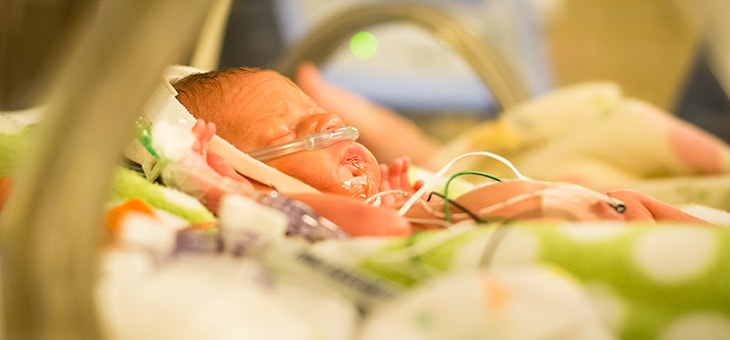Neonatal jaundice
Neonatal jaundice or neonatal hyperbilirubinemia is a common condition observed in neonates, especially in the first 7-10 days of infant life. This can lead to neonatal jaundice due to the inability of immature neonatal liver, especially preterm infants, to process bilirubin.

In most cases, it is mild and self-limiting.
However, if jaundice develops rapidly for more than 2 weeks and as early as 3 weeks, it may be an indication of an underlying condition. High levels of bilirubin can cause permanent damage such as cerebral palsy or other types of brain damage and deafness.
Neonates at risk for jaundice:
- Premature babies
- Children whose blood sample (ABO and Rh incompatibility) are not compatible with maternal blood
- Malnourished children
- Babies with congenital injuries or other internal bleeding
- Children with liver problem
- Children with congenital infections
Symptoms of neonatal jaundice:
The most obvious symptoms of neonatal jaundice are yellowing of the skin and eyes. Other symptoms of neonatal jaundice:
- Light stools (white stools)
- Dark yellow urine
- Dark yellow stain on diaper
- Poor diet
Diagnosis of neonatal jaundice:
Neonatal jaundice is most often diagnosed by a physical examination of the baby. The severity of jaundice can be further examined by measuring bilirubin levels in the blood. Tests to be performed:
- Total Serum Bilirubin (TSB)
- Direct and indirect component
- Blood group and pattern
- Hemogram with peripheral smear
If the jaundice persists for more than 2 weeks, further blood tests are performed to check the underlying conditions.
Treatment of neonatal jaundice:
If a neonate suffers from mild jaundice (physiological jaundice), it cannot be treated as it develops on its own.
If the severity of jaundice is high, neonate may be hospitalized for further treatment. Treatments to be done:
- Phototherapy (single and double surface): Phototherapy is a popular treatment used to treat neonates with jaundice. The baby is exposed to blue light of a certain wavelength and intensity. Single phototherapy (SP) is the most commonly used method. However, when the severity of jaundice is high, greater severity and larger exposure are required. This can be achieved by using it as a double phototherapy.
- Double Volume Exchange Transfusion : When phototherapy fails to reduce neonatal jaundice, a double volume exchange transplant is performed.
- Advances in the treatment of neonatal jaundice: biliblancet, LED lights, intravenous immunoglobulins, etc.
In the neonatology department at Omni Geegils, Vizag has state-of-the-art equipment to treat neonatal jaundice. Omni Giggles has the best neonatologist in Vizag.